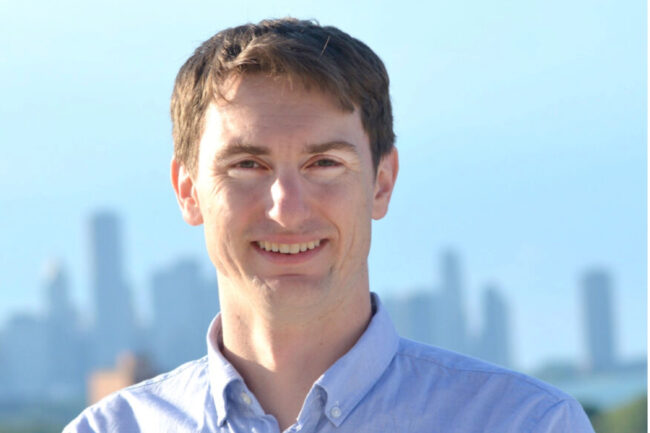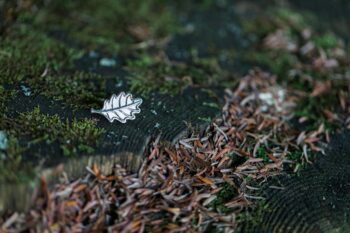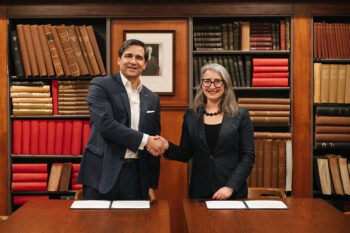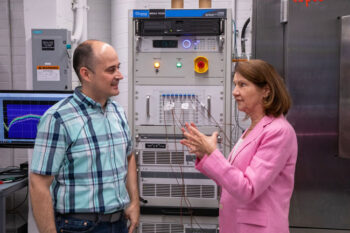Trevor Carey joined the Department of Civil & Mineral Engineering (CivMin) as an assistant professor on July 1, 2024.
“We wholeheartedly welcome our newest faculty member to the department,” says CivMin Chair Marianne Hatzopoulou.
“Students will benefit from the exciting new elements Professor Carey brings to the department in teaching and research. Join us in offering our newest professor a warm welcome to CivMin.”
Writer Phill Snel spoke with Carey to learn more about his research direction, passion for teaching and what attracted him to Toronto. He has relocated from Vancouver to join the department.
Can you tell us a little about yourself?
I am a geotechnical earthquake and hazards researcher. Originally from Salem, Ore., I completed my undergraduate degree in civil engineering at Oregon State University, where I also earned a master’s degree in structural engineering. I then pursued my PhD in geotechnical engineering at the University of California, Davis (UC Davis). Following my PhD, I remained at UC Davis as a postdoctoral fellow for two years. Before joining the Department of Civil & Mineral Engineering at the University of Toronto, I was an assistant professor in the civil engineering department at the University of British Columbia.
Could you explain the focus of your research?
My research focuses on both natural hazards, such as earthquakes, fires and flooding, and anthropogenic hazards, such as the effects of climate change. Traditionally, my work has centred on the impact of dynamic loading on soils. This loading can result from various sources, including earthquakes, traffic, wind, wave action or even foot traffic.
In earthquake research, for instance, we study the location, frequency and intensity of seismic events, as well as the duration of shaking. We also investigate soil resistance to cyclic loading through laboratory experiments, large-scale experimental modelling with specialized equipment, and case studies of both failures and successes in the world around us. Additionally, we employ numerical modelling tools to predict soil performance and machine learning techniques to analyze large datasets efficiently.
Why did you choose U of T?
CivMin offers a collaborative and interdisciplinary environment that aligns perfectly with my research interests in geotechnical earthquake and hazards engineering. Additionally, U of T’s commitment to diversity and inclusion, along with its vibrant academic community, provides an ideal setting for both professional growth and meaningful contributions to the field. The opportunity to work with leading researchers and engage with a diverse group of talented students further solidified my decision to join U of T.
As a new professor, what one piece of advice would you give to new students?
Embrace curiosity and take ownership of your learning. Your time at the University of Toronto is a time to explore new ideas, challenge assumptions and develop critical thinking skills. Don’t be afraid to ask questions, seek out additional resources and engage deeply with the material. Take advantage of office hours, study groups, join one of the student clubs on campus and actively participate in class discussions. Education is a partnership between you and your professors, and the more you invest in your own learning, the more rewarding and enriching your academic experience will be.
What do you hope to accomplish in your new position at U of T Engineering?
My goals are to contribute to the strong history of civil engineering research and training the next generation of engineers who will have to address the complex problems facing society. I want to continue advancing knowledge of how hazards impact the built environment and how we can design or retrofit more resilient and cost-effective infrastructure.
Critical to this knowledge advancement is teaching the fundamentals to students, while also including new state-of-the-art research findings that will become standards. Encompassing these research advancements and teaching efforts is a commitment to promoting diversity and inclusion, aiming to create an engineering workforce that reflects Canada’s diverse population.
What is the most memorable experience in your career so far?
I have had the opportunity to participate in several post-earthquake reconnaissance trips, visiting locations affected by recent earthquakes. These trips often involve examining damage or destruction in communities and larger regions. They are particularly memorable because they highlight how our research and teaching can help mitigate similar damage from future earthquakes. Additionally, these trips allow the research community to identify knowledge gaps that we can study further back on campus.
Is there anything fun/unusual/unexpected about yourself you’d like to share?
I am a big fan of anything outdoors and an avid runner. Even in a large city like Toronto, you may find me running on the many trails throughout the area.



